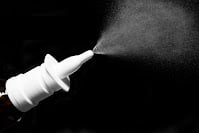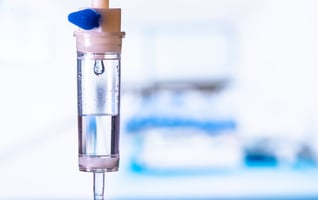Meta-Analysis Reveals Disappointing Efficacy for Esketamine in Depression, Suicidality

Patients with treatment-resistant depression may only receive a modest, short-term benefit from using intranasal esketamine as an add-on treatment, according to a meta-analysis published today in the American Journal of Psychiatry. Moreover, the analysis reveals almost no benefit from esketamine for suicidality compared with placebo.
The study renders sobering judgement on a drug that spurred much excitement after the Food and Drug Administration (FDA) approved it as an adjunct therapy for treatment-resistant depression in 2019. Last week, the FDA expanded the approval to allow esketamine as a stand-alone treatment in adults with treatment-resistant depression.
“The trial data concerning the efficacy of intranasal esketamine as an add-on treatment in depression are mostly negative after the first few days, despite a significantly greater early improvement in comparison to placebo,” wrote Konstantinos N. Fountoulakis, M.D., of the Aristotle University of Thessaloniki, Greece, and colleagues.
The authors analyzed 87 English-language articles about esketamine, including randomized control trials (RCTs), open-label trials, case reports, retrospective chart reviews, and post-hoc analyses of previous RCTs.
Across all of these, results for the efficacy of esketamine for depressive symptoms were modest at best. For instance, among 10 RCTs testing acute depressive response (using the Montgomery-Åsberg Depression Rating Scale) in 979 patients randomized to esketamine and 795 to placebo, almost all results showed esketamine was superior during the first four days but then was inconsistent after one week and not superior to placebo by week four.
A meta-analysis combining these 10 studies suggested that esketamine may be slightly efficacious at four weeks, but the improvements were no better than those seen in patients who augment their antidepressant with an antipsychotic medication.
Similarly, among 11 RCTs examining the effect of esketamine on suicidality, results suggest a significant positive effect two to four hours after administration. But the 24 hour data was inconsistent, and all seven trials reporting on suicidality around week four were negative.
Fountoulakis and colleagues did cite the positive results of a clinical trial comparing esketamine monotherapy to placebo, which the FDA used to grant its new approval. “While these results, if verified, point to an efficacy of esketamine as monotherapy, they are not superior to the results expected by continuing the same antidepressant or switching to a new one,” they wrote.
The authors also drew attention to concerns about safety and potential for abuse and addiction associated with esketamine, and to the fact that long-term effects of the drug on cognition are unknown.
For related information, see the American Journal of Psychiatry article, “Synthesizing the Evidence for Ketamine and Esketamine in Treatment-Resistant Depression: An International Expert Opinion on the Available Evidence and Implementation.”
(Image: Getty Images/iStock/DDurrich)
Don't miss out! To learn about newly posted articles in Psychiatric News, please sign up here.





